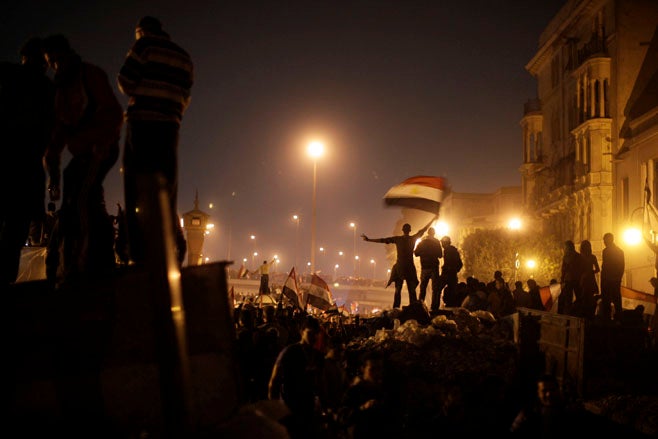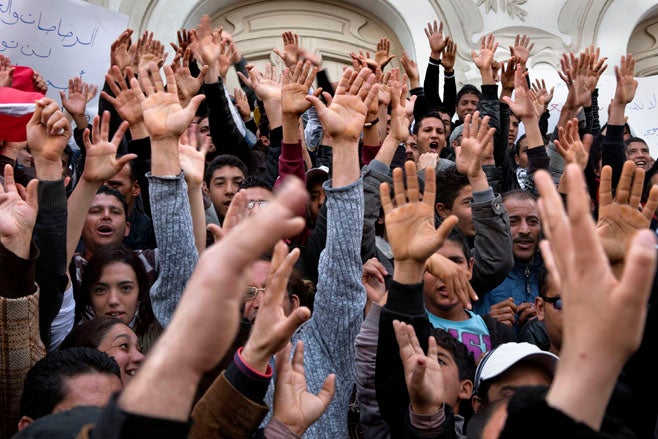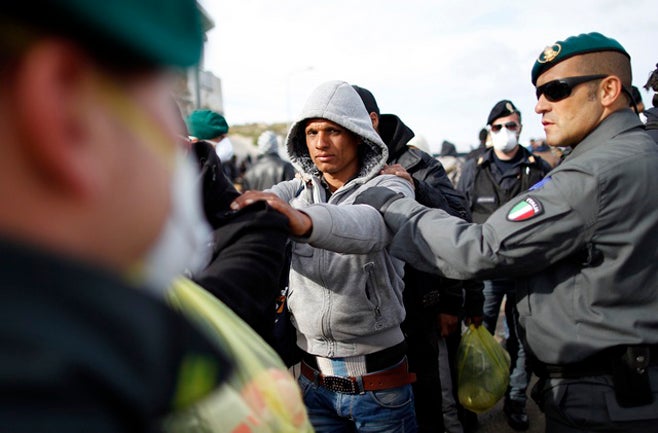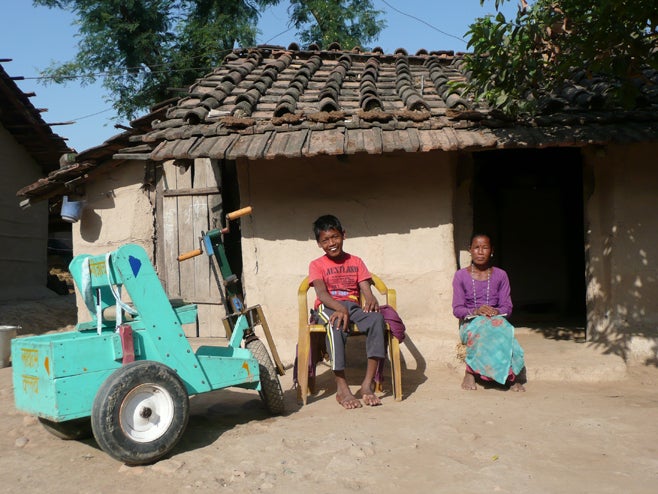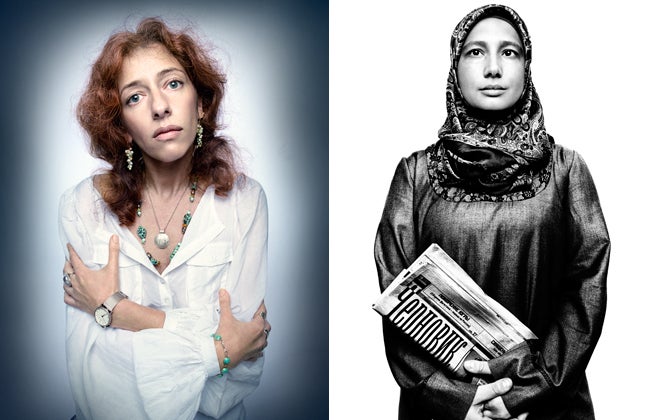Uzbekistan’s human rights record remains appalling, with no meaningful improvements in 2011. Torture remains endemic in the criminal justice system. Authorities continue to target civil society activists, opposition members, and journalists, and to persecute religious believers who worship outside strict state controls.
Freedom of expression remains severely limited. Government-sponsored forced child labor during the cotton harvest continues. Authorities continued to deny justice for the 2005 Andijan massacre in which government forces shot and killed hundreds of protestors, most of them unarmed.
Reacting to the pro-democracy Arab Spring movements, the Uzbek government increased the presence of security forces across the country and widened its already-tight control over the internet. Despite the government’s persistent refusal to address concerns about its abysmal record, the United States and European Union continued to advance closer relations with the Uzbek government in 2011, seeking cooperation in the war in Afghanistan.
Human Rights Defenders and Independent Journalists
Uzbek authorities regularly threaten, imprison, ill-treat, and torture human rights defenders and other peaceful civil society activists. In 2011 the Uzbek government continued to harass activists and interfere with independent civil society.
The Uzbek government holds at least 13 human rights defenders in prison, and has brought charges against others, because of their human rights work. They are: Solijon Abdurakhmanov, Azam Formonov, Nosim Isakov, Gaibullo Jalilov, Alisher Karamatov, Jamshid Karimov, Norboi Kholjigitov, Abdurasul Khudainasarov, Ganihon Mamatkhanov, Habibulla Okpulatov, Yuldash Rasulov, Dilmurod Saidov, and Akzam Turgunov.
Several are in very poor health and at least seven have been ill-treated or tortured in custody. For example, relatives of imprisoned rights defender Gaibullo Jalilov reported after a January 2011 visit that he had been repeatedly tortured, including being beaten with a stick that left him nearly deaf in both ears.
Other activists, including independent journalists and opposition figures, remain imprisoned on politically motivated charges. While authorities released the poet Yusuf Jumaev and three activists, Farkhad Mukhtarov, Norboi Kholjigitov, and Maksim Popov, the government did not ease its overall campaign to crush its critics.
Members of the Human Rights Alliance, an Uzbek human rights group, were regularly subjected to arbitrary detention and de facto house arrest for their activism. On April 24 a Russian television program exploring conditions for ethnic Russians in Central Asia interviewed Alliance members Elena Urlaeva, Viktoriya Bazhenova, and Tatyana Dovlatova. The next night assailants accosted the activists in their homes, screaming insults and threatening violence.
Following the airing of the program, Dovlatova was sued for defamation, a case that appears to have been orchestrated by authorities. Police later raided her home and she lost badly needed disability benefits.
In June Uzbekistan’s Supreme Court granted a Justice Ministry petition to “liquidate” Human Rights Watch’s Tashkent office. The ruling followed years of the Uzbek government obstructing Human Rights Watch’s access to the country, including denying visas and staff member accreditation, most recently in December 2010. The obstruction and legal ruling led to the organization’s expulsion from Uzbekistan after 15 years in the country.
In July, in a development that appears designed to discourage diplomats from engaging with independent activists, authorities brought administrative charges against a local British Embassy employee, Press Secretary Leonid Kudryavtsev, for holding “unauthorized meetings” with human rights defenders.
On August 10 Dovlatova and activist Abdullo Tojiboy-ugli were attacked by assailants in separate incidents that appear to have been instigated by authorities.
On August 22 journalist Elena Bondar was detained at Tashkent airport after returning from a journalism course abroad. Security agents confiscated her flash drives, interrogated her, and sent the confiscated items for “analysis” to the Center for Monitoring of the Uzbek Information Agency, which has been involved in trumping up cases against journalists.
Also in August Urlaeva was detained and beaten when she went to investigate a case of three TV journalists, whom authorities had charged with extortion in Namangan.
The Andijan Massacre
Six years later, the government continues to refuse an independent investigation into the 2005 massacre of hundreds of citizens in Andijan, denying justice to victims and failing to bring to account those responsible. Authorities continue to persecute anyone suspected of having participated in, or witnessed, the atrocities.
The Uzbek government also continued to intimidate families of Andijan survivors who have sought refuge abroad. Police subject them to constant surveillance, call them for questioning, and threaten them with criminal charges or home confiscation.
Torture, Ill-Treatment, and Criminal Justice
Torture remains rampant in Uzbekistan and continues to occur with near-total impunity. Rights of detainees are violated at each stage of investigations and trials, despite habeas corpus amendments that went into effect in 2008. The Uzbek government has persistently failed to meaningfully implement steps to combat torture that the United Nations special rapporteur in 2003 and other international bodies have recommended.
Suspects are not permitted access to lawyers, a critical safeguard against torture in pre-trial detention. Police use torture to coerce confessions from detainees. Authorities routinely refuse to investigate allegations of abuse.
In July authorities arrested Said Ashurov, a Tajik national who worked for the British company Oxus Gold, which the government had forced to close earlier in the year. A military court sentenced Ashurov to 12 years in prison for “possession of state secrets” after a closed trial. Witnesses who testified against him reported to Human Rights Watch that they were beaten in detention to procure their testimony. Prison authorities have denied Ashurov, who suffers from chronic hepatitis B, access to adequate medical treatment, resulting in a serious deterioration of his health.
Human Rights Watch continues to receive regular, credible reports of torture and ill-treatment in pre-trial and post-conviction detention.
Freedom of Religion
Although Uzbekistan’s Constitution ensures freedom of religion, Uzbek authorities continued their unrelenting, multi-year campaign of arbitrary detention, arrest, and torture of Muslims who practice their faith outside state controls. Over 100 were arrested or convicted in 2011 on charges related to religious extremism.
Continuing a trend that began in 2008, followers of the late Turkish Muslim theologian Said Nursi continued to be prosecuted for religious extremism. Dozens of Nursi followers were arrested or imprisoned in 2011.
Authorities also continue to impose short-term prison sentences and fines on Christians and members of other minority religions conducting peaceful religious activities for administrative offenses, such as illegal religious teaching. On February 4 the Supreme Court again dismissed an appeal by Tohar Haydarov, a Baptist sentenced to 10 years on allegedly fabricated drug-related charges. In July a Protestant couple in Fergana, Muradiljon Umurzakov and Dilorom Mamasadikova, were physically abused and threatened with charges after police raided their home and found a Bible.
Authorities continue to extend sentences of religious prisoners for alleged violations of prison regulations. Such extensions occur without due process and can add years to a prisoner’s sentence.
In November relatives of Muslim religious prisoners serving sentences at Jaslyk colony, Uzbekistan’s most notorious prison, told Human Rights Watch that following a hunger strike, prison authorities tortured several inmates, including by undressing them naked in front of other inmates, beating, and subjecting them to sexual humiliation.
Forced Child Labor
Forced child labor in the cotton fields remains a serious concern. The government took no meaningful steps to implement the two International Labour Organization (ILO) conventions on child labor, which it ratified in March 2008. Despite repeated requests, it continued to refuse ILO access to monitor the harvest.
The government continues to force 1.5 to 2 million schoolchildren as young as nine-years-old to help with the cotton harvest for two months a year. They live in filthy conditions, contract illnesses, miss school, and work daily from early morning until evening for little to no pay. Hunger, exhaustion, and heat stroke are common.
Human Rights Watch is aware of several cases of authorities harassing activists who tried to document forced child labor. In September authorities detained activists Gulshan Karaeva and Nodir Akhatov while they photographed children forced to pick cotton in the Kashkadarya region.
Also in September, responding to concerns from Human Rights Watch and other groups, the organizers of New York Fashion Week cancelled a show by the president’s daughter, Gulnara Karimova, who serves as Uzbekistan’s permanent representative to the UN and its ambassador to Spain.
Key International Actors
The Uzbek government continued to refuse to cooperate with international institutions but faced virtually no consequences for this intransigence. It continues to deny access to all eight UN special procedures that have requested invitations, has failed to comply with recommendations made by various expert bodies, and blocks the ILO from sending independent observers to monitor compliance with the prohibition of forced child labor in the cotton industry.
The EU’s position on human rights remained disappointingly weak, with virtually no public expressions of concern about Uzbekistan’s deteriorating record. In January the European Commission president, Jose Manuel Barroso, received President Islam Karimov in Brussels, a highly controversial visit that marked Karimov’s first to Europe since the Andijan massacre. The EU’s eagerness to deepen its relationship with Uzbekistan without requiring improvements contrasted with its recent re-thinking of its relationships with autocratic governments in the Middle East. The annual human rights dialogue between the EU and Uzbekistan, held in May, again yielded no known results and appeared to have no bearing on the broader relationship.
In 2011 the US deepened its policy of re-engagement with Uzbekistan. Since 2004 Congress had expressly restricted assistance to Uzbekistan based on its deplorable rights record and further tightened restrictions following the Andijan massacre. However, in a particularly troubling move, and despite no meaningful improvements, the Obama administration sought to re-start assistance and provide military aid to Uzbekistan.
Uzbekistan is seen as a critical stop in the Northern Distribution Network, through which the US has sent non-lethal supplies to Afghanistan since 2009 as an alternative to what are viewed as unstable supply lines through Pakistan. US military contracts with Uzbeks as part of this supply chain are potentially lucrative for persons close to the Uzbek government. Despite the State Department's re-designation in September of Uzbekistan as a “Country of Particular Concern” for systematic violations of religious freedom, the US government retained a waiver on the sanctions outlined in the designation.
